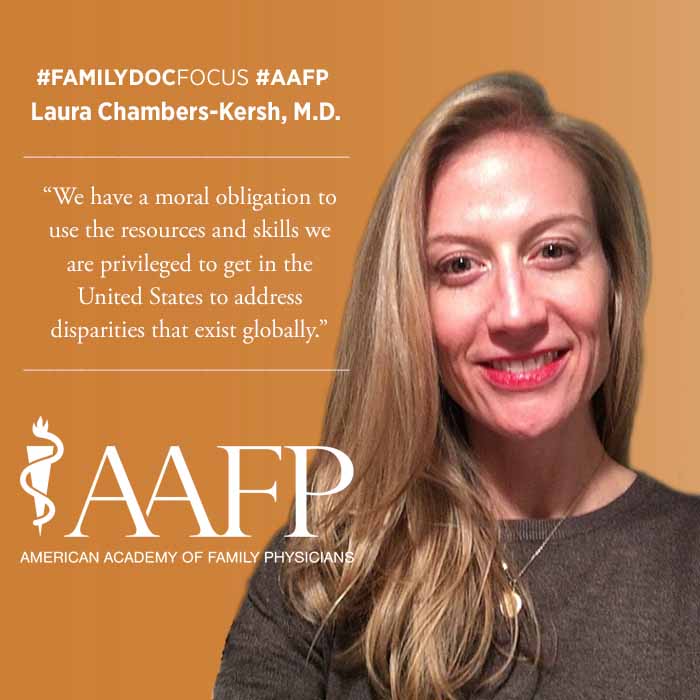This FP's Roots Are in Global Health
February 25, 2019 1:33 pm David Mitchell – When Laura Chambers-Kersh, M.D., volunteered to work for six weeks in Liberia amid an Ebola outbreak, her family was understandably concerned. Ironically, it was her mother, family physician Lois Henson, D.O., who had first exposed Chambers-Kersh to working with underserved communities.
"That's how we were raised," said Chambers-Kersh, assistant professor of family and community medicine at the University of New Mexico in Albuquerque. "When I was 15, my mom took me and my sister to spend time at an Indian Health Service hospital on the Navajo Nation. She told them she would come and volunteer for two weeks if we could come, too. I really loved it."
Chambers-Kersh helped triage patients, took vitals on the wards, spent time in the ER and worked in the sterilization room. She also experienced a culture far different from the one she knew in suburban Ohio.
"I got to really see what a small-town hospital is like," said Chambers-Kersh, whose father also is a physician. "It also was my first time in a place where we were the obvious minority, the ones who looked different from everyone else at the grocery store. That was the experience that made me start thinking about being a doctor and helping the underserved."
Chambers-Kersh learned Spanish while spending a year in Costa Rica as an exchange student and later put it to use during medical school on a six-week educational exchange in Cuba. But the lesson that truly inspired her global health journey was found in the pages of a book. During residency, Chambers-Kersh read Mountains Beyond Mountains: The Quest of Dr. Paul Farmer, A Man Who Would Cure the World,the Tracy Kidder book that follows the eponymous physician to Haiti, Peru and Russia.
"Something I thought about while reading that book," she said, "is that we have a moral obligation to use the resources and skills we are privileged to get in the United States to address disparities that exist globally."
Since then, Chambers-Kersh worked for the Indian Health Service for two years in Shiprock, N.M., spent a year at a government maternity hospital in Malawi with the support of the small nongovernmental organization Health Frontiers and volunteered at Kwai River Christian Hospital on the Thailand-Myanmar border. While working at a federally qualified health center in Austin, Texas, she helped bring together primary care physicians, OB-Gyns, nurse practitioners, mental health providers and social workers to start a clinic for victims of human trafficking.
Chambers-Kersh's most recent international project is working as a clinical educator for the University of California, Los Angeles, Center for Global Health's Mozambique Partnership. The country is building its first family medicine residency, a collaboration between the Ministry of Health, the Cuban government and UCLA.
"We hope to develop a cadre of family physicians who will be able to use the family medicine model to improve health care in that country," she said.
For a year, Chambers-Kersh spent two weeks per quarter in Mozambique. She's taking a break from that schedule after the recent birth of her first child, but she would like to return to the country and devote more time to the project.
"It takes more than two weeks at time. At some point, I want to spend at least a year there," she said, and then added with a laugh, "Don't tell my mom."
